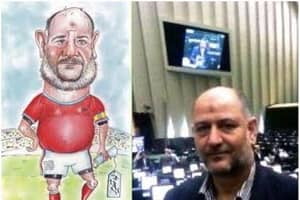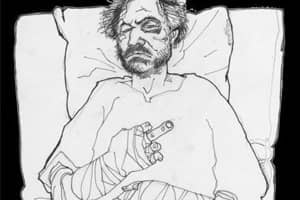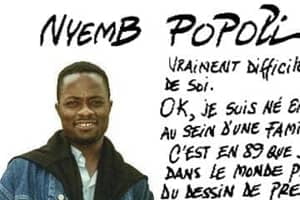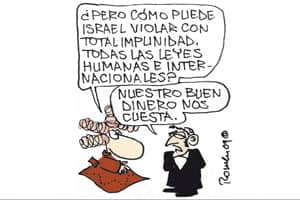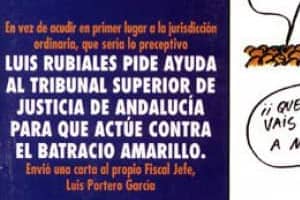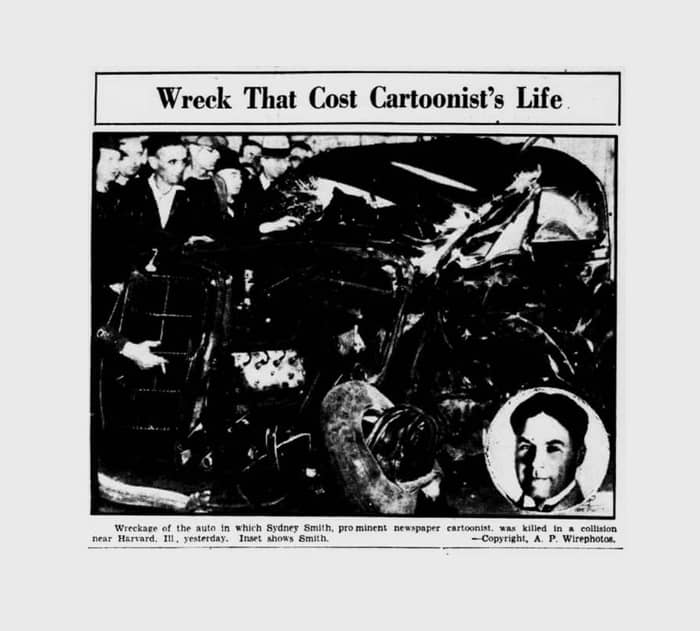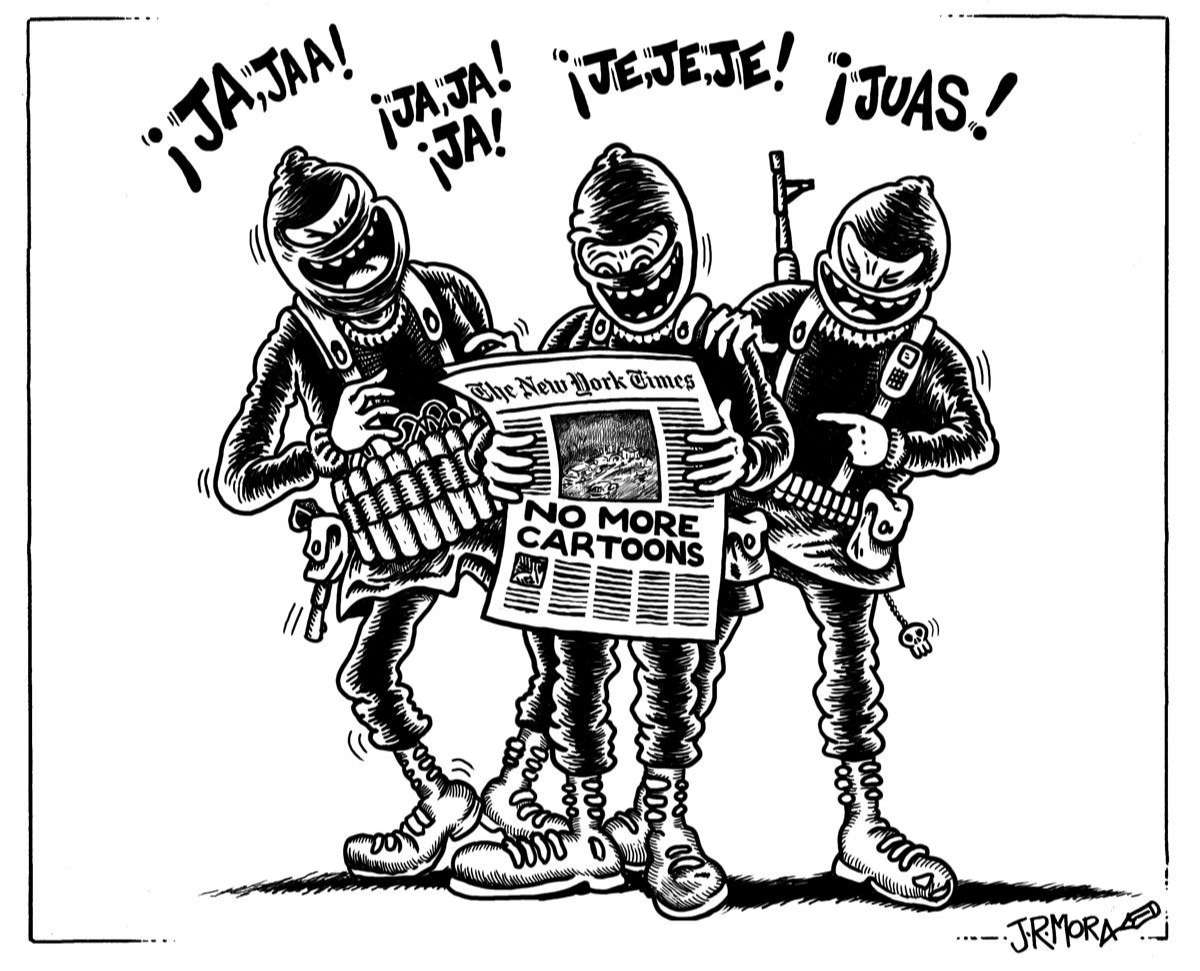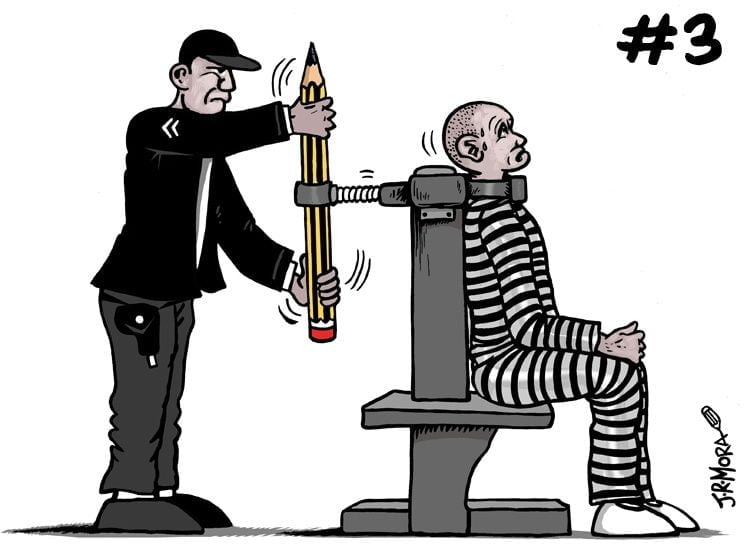This is the second part of the first list I started in 2014.
This is a compilation of cases that I remember, reviewed, or should have reviewed at the time, of cartoonists who have had problems of some importance because of their cartoons or satirical illustrations.
There are also some cases of other people who, without being cartoonists, have had problems for sharing them.
The cases are arranged in chronological order.
A link to a detailed review of each case is included in articles by the author or others. If you find any errors or information that you think should be added, don't hesitate to contact us.


2014 Belgium-Colombia/ Pascal "Pad'R" and RTBF
A cartoon by cartoonist Pad'R, shown on Belgian television station RTBF, in which three Colombian national team players are shown crouching down and sniffing the referee's spray on the pitch, prompted the Colombian ambassador to Belgium to express his indignation and demand a rectification and apology.

2014 Spain/ El Jueves, various authors
The disappearance of the cover of El Jueves nº 1932 from its website with a joke by Manel Fontdevila about the abdication of King Juan Carlos triggered the abandonment of a good number of authors. The first news spoke of printing problems, but the reality was that the publishing company (RBA) had decided to withdraw and/or destroy the copies and also prohibited the magazine from showing jokes about the Royal Household on the cover.

2014 Spain/ Iratxe Fernández "AtxE" & Laura Santolaya "p8ladas".
The Huffington Post (PRISA) did not want to publish this cartoon by "AtxE" about the monarchy with the ambiguous argument of its director (Montserrat Domínguez):"it did not convince its director and will not be published". AtxE announced, with another cartoon, on its Twitter account that it was no longer collaborating with the newspaper. The following day another contributor, Laura Santolaya, also announced that she would stop collaborating for the same reason.

2014 Bolivia/ Alejandro Salazar "Al-Azar"
In March, during the Oruro Carnival, a catwalk collapsed on a group of people. The result was five dead and dozens injured. Alejandro Salazar "Al-Azar" made an allusive cartoon for the newspaper La Razón. Offended political representatives and groups sent complaints to the newspaper. Some called for the sacking of the author and went so far as to threaten to burn the newspapers and prevent their circulation.

2014 Ecuador / Xavier Bonilla Zapata, "Bonil".
A "Bonil" joke related to a police raid on Fernando Villavicencio's house led Supercom to request a copy of the cartoon and the cartoonist's details, opening a process in which the author had to defend himself and explain his cartoon. Finally, the newspaper was fined 2% of its average turnover for the last three months and the cartoonist was given 72 hours to publish a correction of the cartoon.

2014 Algeria/ Djamel Ghanem
Particularly curious case. Djamel Ghanem, a cartoonist for the Algerian daily La Voix de l'Oranie, was reportedly sued by the editor of his own newspaper before an examining magistrate in Oran for "insulting the president" in a cartoon in which he was not even depicted or mentioned.

2013 India / Kanika Mishra
For Kanika Mishra, the problems began in 2013, when she drew cartoons critical of Asaram Bapu, a popular religious leader and self-proclaimed god-man who had been accused of raping a minor. He received insults and threats of death and rape online and by phone, and spent five months afraid to go out fearing an attack. He finally resisted and decided to report the threats to the police.

2013 Spain / Pepe Farruqo
The cartoonist Jose Fco López Rivera, who signs as"Pepe Farruqo", collaborated in the newspaper ARA from 2011 to 2013 with a daily cartoon. The author claimed(2) that several of his cartoons were censored and that a call from Mònica Tarribas to the editorial office may have been what caused the end of the collaboration. Farruqo also claims that during those two years they were censored a good handful of vignettes, which made him feel disappointed.

2013 Peru/ Carlos Tovar "Carlín".
Enrique Mendoza, president of the judiciary, demanded a rectification from"Carlín", warning him that if he did not do so he would sue him in court. The cause was a cartoon published in the print and online edition of the Peruvian newspaper La República, where Carlín has worked since 2002.

2013 Mexico / Fernando de Anda "El Fer".
The newspaper Excélsior manipulated and published the cartoon of "El Fer", completely changing the text and the author's original message. El Fer made public the manipulation of the media and although he received an apology on Twitter from the editor, he quit his job after seven years publishing in this newspaper.


2012 Syria/ Akram Raslan
Akram Raslam was arrested on 2 October 2012, since when there have been only rumours about the Syrian cartoonist's legal situation. In September 2015, the Syrian magazine Souriatna claimed that Akram Raslam had died in hospital sometime in the spring of 2013 due to his fragile state of health caused by torture.

2012 India / Aseem Trivedi
In December 2011, Trivedi received an email from the company hosting his website announcing that the domain and hosting of the site were being suspended for displaying objectionable images and text related to the Indian flag and coat of arms. In September 2012, the cartoonist was arrested in Mumbai on charges of sedition for his cartoons about corruption in India and charged with insulting the national emblems.



2012 Syria/ Akram Raslan
Farzat was abducted in August 2011 by a group of masked men, speculated to be members of the security services, who assaulted and beat him in Umayyad Square, fracturing his left hand (with which he draws) and right arm, and burning his body with cigarettes. His left hand (the one he draws with) and right arm were broken, and his body was burnt with cigarettes, and the attackers reportedly threatened to break both his hands to prevent him from continuing to draw.

1992/2011 Cameroon/ Paul Nyemb - "Popoli".
Cameroonian "Popoli's" troubles date back to 1992, when the governor of Douala ordered his arrest for a series of political cartoons critical of local and national government officials. To avoid arrest, Popoli hid in a swamp for 20 days. His ordeal had only just begun.

2011 Malaysia /Zulkiflee Anwar Ulhaque, "Zunar".
Zunar had to deal with 10 years of constant state persecution and censorship for his cartoons critical of high-ranking government officials. Zunar was arrested and charged with sedition. The cartoonist filed lawsuits over his detention and the seizure of his books and magazines.




2010 Germany / Titanic Magazine
Since its inception, the German satirical magazine "Titanic" has been hijacked 35 times, several personalities filed successful lawsuits. The Church has had to deal with it on several occasions. The publisher had to face 55 lawsuits and the magazine went through hard times that brought it to the brink of insolvency.

2010 Spain / C. M. Meca, R. Betancort, J.F. Carreño
This story began on 18 January 2008. The satirical website "El Agitador", published a humorous photomontage together with a text. On 25 November 2010, Court No. 1 of Arrecife issued an order to remove the cartoon from the website. In 2013, the authors were sentenced to pay almost 20,000 euros, but it did not stop there.

2010 Sri Lanka / Prageeth Eknaligoda
Journalist and cartoonist Prageeth Eknaligoda left his work in Colombo on the night of 24 January 2010 and was never seen again. He was 50 years old at the time. It was two days before the presidential election in Sri Lanka. Prageeth is one of the thousands of missing persons in Sri Lanka.

2009 Spain / Carles Romeu Müller "Romeu".
It was not the first time that cartoons about Israel's actions in Palestine provoked complaints, but a cartoon by Romeu in El País published on 30 June 2009 prompted Jacobo Israel Garzón, president of the Federation of Jewish Communities of Spain, to send a letter to the newspaper entitled "Tópicos", which was published on 3 July.

2009 Italy/ Vauro Senesi
RAI, Radiotelevisione Italiana, chose to suspend its collaborator, cartoonist and journalist Vauro Senesi from a programme on its second channel for his treatment of the L'Aquila earthquake disaster on 6 April, which received an avalanche of criticism, including from Italian Prime Minister Silvio Berlusconi and the president of the Italian Chamber of Deputies, Gianfranco Fini.

2009 Morocco/ Khalid Gueddar
A cartoon by Jhalid Gueddar, published in September on the front page of the daily Akhbar Al Youm depicting Prince Moulay Ismail, cousin of King Mohammed VI, resulted in a definitive closure order for the newspaper. Also, a fine of 8,900 euros was imposed on the cartoonist and a fine of the same amount on the editor of the newspaper, as well as a year's imprisonment for both, although it seems that they will not have to go to prison.


2009 USA / Mike Peters
A cartoon by Mike Peters is published in several US newspapers. Gabriel Silva, manager of the National Federation of Coffee Growers of Colombia (Federacafé) announced a lawsuit claiming 20 million dollars in damages for intellectual property damage and defamation for linking organised crime activities with coffee producers.

2008 Spain/ Sergio de Horna (Citibank) vs. CGT
In July 2008, the cartoonist Carlos Azagra testified as a witness at the Court of First Instance in Alcobendas (Madrid). The director of Citibank España, Sergio de Horna, had sued the CGT trade union for an offence against the right to honour, privacy and image for the cartoon by Carlos Azagra published in issue 1538 of the magazine El Jueves which the CGT trade union section used in a poster to denounce fraudulent practices on the part of Citibank.

2008 Spain / José Antonio Rodríguez González and Javier Ripa and Nicola Lococo
The Basque newspapers Deia, its supplement Caduca HOY, and Gara published in 2006 a satirical cartoon and an article in relation to the "Mitrofán" case, the name of the bear that King Juan Carlos was said to have killed during a hunt in Russia. For these works, the authors were charged with serious insult to the crown in the figure of the king. They were acquitted on 22 December 2008.

2007 Spain/ Manel Fontdevila and Guillermo Torres
On 20 July, Judge del Olmo ordered the seizure of issue 1,573 of the magazine El Jueves and requested that all copies be withdrawn from points of sale, the reason being its cover. Guillermo's drawing, with a script by Manel, under the headline"2,500 euros per child" showed caricatures of Prince Felipe and Letizia in bed practising the doggy style. The scene illustrated a joke about the ZP government's baby cheque. The authors were convicted of insulting the crown prince.


2006 Iran / Mana Neyestani
Mana Neyestani published a cartoon in the supplement of the daily "Iran" and it was the trigger for his problems. The cartoon depicted a cockroach character speaking Azeri. Ethnic Azeris interpreted this as an insult and demonstrations and riots broke out. The cartoonist received death threats.

2002 Panama/ Víctor Ramos López "Vic
The former president from 1994 to 1999, Ernesto Pérez Balladares, filed a complaint against the cartoonist of La Prensa, Víctor Ramos "Vic", for an alleged offence against honour under article 175 of the Penal Code, for which he could be sentenced to up to two years in prison.

2000 Panama/ Enrique Briceño "RAC
RAC and the editor of La Prensa were sued by Panama's former vice-president Arias Calderón on the grounds that he was insulted in a cartoon of 30 December 2000 in which a caricature of Calderón appears hand in hand with a figure representing death with the acronym of the political group Partido Revolucionario Democrático (Democratic Revolutionary Party).


1997 Spain/ Francisco Javier Martín Merlo and Antonio José Martín Merlo "Gato".
Between 1997 and 2003, one of the longest and crudest legal battles in living memory was fought between the satirical magazine "El Batracio Amarillo" on the one hand, and the PSOE of Motril (Granada) and the socialist mayor Luis Manuel Rubiales on the other. A long crossroads of lawsuits, satirical articles and cartoons.


1991 Panama / Joaquín Carrasquilla
The then president of Panama, Guillermo Endara, brought a libel and slander charge against cartoonist Joaquín Carrasquilla, arguing that he had dishonoured, discredited and belittled him in a cartoon. The cartoon was published in the newspaper La Prensa and depicted the president with money in his pocket as he said goodbye to Colonels Marcos Justine and Rafael Cedeño.

1990 Spain / Ramón
The cartoonist Ramón Gutiérrez Díaz, who signs as Ramón, or R, sent his cartoon to the newspaper "YA" at the end of January 1990, in which a character changes the name of the Constitutional Court to "Prostitutional". On 23 February his cartoon was published again, to illustrate the news that the Attorney General, at the request of the Minister of Justice, Enrique Múgica, had filed a criminal complaint against the cartoonist.

1978 Spain / Colectivo Zeta (8 authors)
The year was 1978. According to the chronicles of the time, an anonymous complainant considered that in issue 3 of the Zeta fanzine there were two jokes that could constitute a crime against religious freedom. In October 1979, the trial was held and the eight cartoonists were convicted and were on the verge of being imprisoned.
Guide to cartoonists.















